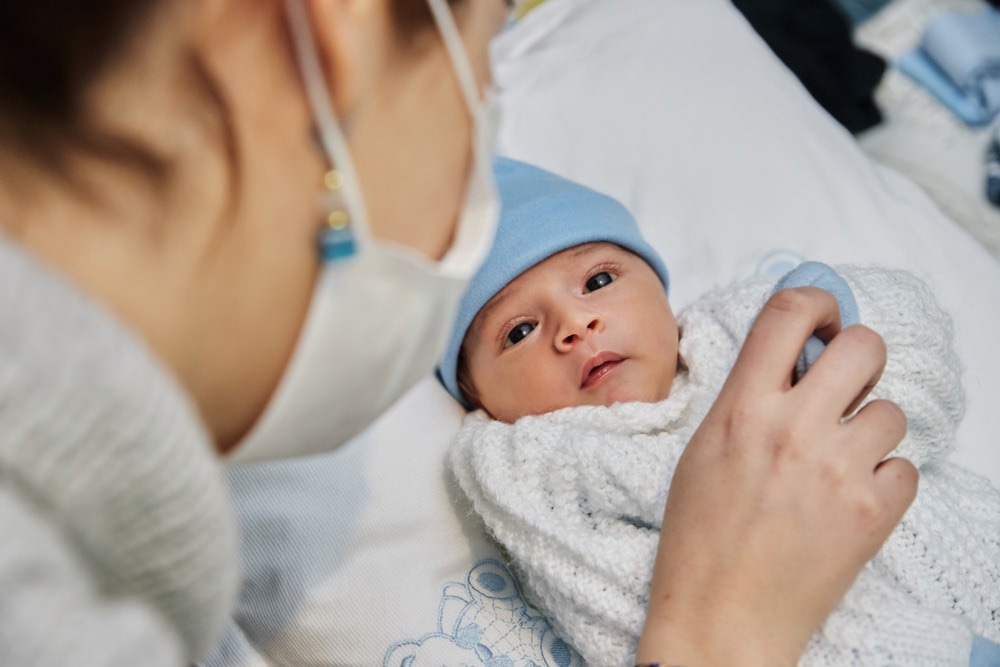In a recent study published in the International Journal of Environmental Research and Public Health, researchers investigate the obstetric and neonatal outcomes in pregnant females infected with the severe acute respiratory syndrome coronavirus 2 (SARS-CoV-2) who did not receive a coronavirus disease 2019 (COVID-19) vaccine.
 Study: SARS-CoV-2 Infection in Pregnancy: Clues and Proof of Adverse Outcomes. Image Credit: daniel catrihual / Shutterstock.com
Study: SARS-CoV-2 Infection in Pregnancy: Clues and Proof of Adverse Outcomes. Image Credit: daniel catrihual / Shutterstock.com
Background
Pregnant females are at a higher risk of developing severe complications following SARS-CoV-2 infection. This is most likely due to alterations in the immune system that occur during pregnancy.
Despite the numerous studies that have described the pathophysiology of SARS-CoV-2 infection during pregnancy, there remains a lack of data on the consequences of the coronavirus disease 2019 (COVID-19) in the mother and her neonate, as well as the risk of vertical transmission.
About the study
In the current prospective observational study, researchers enrolled pregnant females infected with SARS-CoV-2 and a matched cohort of uninfected pregnant women between December 2020, and December 2021 in Rome, Italy.
The study population comprised pregnant females who were at least 18 years old and unvaccinated before or at hospital admission. An obstetric ultrasound scan was performed on all enrolled females, in addition to blood, nasopharyngeal, and vaginal swab collection. Lung ultrasounds were also performed to assess for the presence of pneumonia, its severity, and the extent of ventilatory dysfunction.
Post-delivery, neonatal nasopharyngeal swabs, as well as amniotic fluid, cord blood, and placenta tissue samples were collected. Cord blood samples were subsequently tested for antibodies against the SARS-CoV-2 spike (S) and nucleocapsid (N) proteins, as well as the presence of SARS-CoV-2 ribonucleic acid (RNA), whereas placental tissue samples were used for histological evaluation.
Study findings
A total of 204 pregnant females and 136 controls participated in the study, 68 of whom tested positive for COVID-19. The mean age of SARS-CoV-2-infected women and control patients was about 30 and 33 years, respectively.
Of all pregnant females who tested positive for SARS-CoV-2, 35.29% and 64.71% experienced symptomatic and asymptomatic infection, respectively. About 3% of these women contracted COVID-19 in the first trimester, whereas 13.43% and 83.58% were infected with SARS-CoV-2 in the second and third trimesters, respectively.
SARS-CoV-2-positive pregnant women had fewer chronic diseases than controls at a rate of 14.71% and 17.91%, respectively. However, 44.12% of SARS-CoV-2-infected pregnant women reported pregnancy-associated complications as compared to 18.38% of controls.
About 12% and 10% of SARS-CoV-2-positive and control patients delivered preterm, respectively. As compared to controls, SARS-CoV-2-positive females were at a greater risk of developing diabetes, intrauterine growth restriction, and hypothyroidism during pregnancy.
Furthermore, neonates born to SARS-CoV-2-positive mothers were at a higher risk of low birth weight and an arterial umbilical pH of less than seven as compared to controls. Among these, the birth weights of neonates of symptomatic and asymptomatic mothers were lower at about 2.8 kg and 3.1 kg, respectively.
Vaginal swabs and amniotic fluid samples were negative for SARS-CoV-2 infection. However, SARS-CoV-2 RNA was detected in 4.4% of maternal samples, 2.9% of umbilical cord blood samples, and 1.5% of placental tissue samples, thus indicating that vertical transmission is rare.
Only one patient with a complicated monochorial diamniotic twin pregnancy exhibited the transplacental passage of SARS-CoV-2. All neonates born to women infected with SARS-CoV-2 did not exhibit any viral RNA in their nasopharyngeal swabs.
Vascular malperfusion and chronic intervillositis were observed in the placental biopsy samples of all pregnant females with symptomatic SARS-CoV-2 infection. These clinical manifestations point to an indirect effect of a catastrophic inflammatory response due to SARS-CoV-2 infection that can impact fetal growth.
Neonates born to both symptomatic and asymptomatic mothers had comparable anti-S and anti-N antibody levels in their cord blood.
Conclusions
Overall, the study findings indicate a potential relationship between symptomatic SARS-CoV-2 infection during pregnancy and adverse pregnancy outcomes. These women and their infants were more susceptible to developing severe obstetric and neonatal outcomes, respectively.
The observed higher rates of gestational diabetes in SARS-CoV-2-infected women due to new onset insulin imbalance and resistance suggests the potential entry of SARS-CoV-2 into pancreatic β cells through angiotensin-converting enzyme 2 (ACE2) receptors.
At the time of this study, Italy had not recommended COVID-19 vaccination for pregnant females. Thus, further studies are needed to investigate the effect of COVID-19 vaccination on adverse obstetric outcomes in infected pregnant women.
Journal reference:
- Sessa, R., Filardo, S., Masciullo, L., et al. (2023). SARS-CoV-2 Infection in Pregnancy: Clues and Proof of Adverse Outcomes. International Journal of Environmental Research and Public Health 20(3). doi:10.3390/ijerph20032616

 PARENTING TIPS
PARENTING TIPS PREGNANCY
PREGNANCY BABY CARE
BABY CARE TODDLERS
TODDLERS TEENS
TEENS HEALTH CARE
HEALTH CARE ACTIVITIES & CRAFTS
ACTIVITIES & CRAFTS

